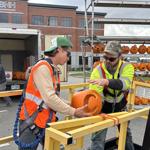![]()
From stuck to unstuck: Signs therapy is starting to work
Therapy starts working when you feel less stuck, notice patterns, set new boundaries, or respond to stress in a more grounded way.
Spring Health shares some key signs that therapy is working.
1. You Start Noticing Your Thoughts
One of the biggest shifts clients experience in therapy is the ability to notice their thoughts. What once felt automatic —spiraling into self-criticism, jumping to worst-case scenarios, or reacting impulsively —becomes something you can observe with a bit of distance.
This kind of mental shift is particularly common among clients participating in cognitive behavioral therapy (CBT), a structured and evidence-based approach that helps you identify, challenge, and reframe unhelpful thought patterns.
Instead of letting your thoughts dictate your emotions or actions without question, you begin to pause and reflect. Midway through a negative thought, you might catch yourself and think, “Wait … is that actually true?” That moment of noticing? That’s therapy at work, and the beginning of real change.
2. You Have Less “All or Nothing” Thinking
Therapy often helps clients find balance. We tend to think in extremes: either chasing perfection or clinging to a single belief. Therapy offers perspective so you can start to say: “It’s not perfect, but that’s okay,” or, “Two things can be true at once.”
This type of emotional growth is all about flexibility, and it’s a sign that you’re making really good progress in therapy.
3. You Set a Boundary
Boundaries, boundaries, boundaries … This is the mental health buzzword of the year. And with good reason. Setting boundaries can feel pretty uncomfortable, especially when setting them in relationships. Maybe you finally tell your mom, “I don’t need more parenting advice,” or you let your boss know, “I won’t be responding to messages after 6 p.m.”
If it feels hard, that’s because it is. First, you have to admit to yourself that something isn’t working. Then, you have to speak up about it, often to someone you care about or rely on. Both steps take real emotional effort. So, if you’re doing it, it's a sign therapy is working. You’re facing hard moments instead of avoiding them by advocating for your needs.
4. You Handle a Trigger Differently
One way to tell if therapy is working is when you start responding differently to your triggers. Maybe you pause to breathe instead of shutting down. You journal instead of rage-texting a friend.
While therapy doesn’t erase triggers or even heal them, it gives you the tools to handle them as they come.
5. You Feel Better
Maybe it’s a little extra spring in your step or a quiet excitement about trying something new. Maybe your sleep is improving. Maybe you noticed relationships seem less difficult. It’s not about suddenly having all the answers, but about reconnecting with the parts of yourself that stress, doubt, burnout, and depression pushed aside.
Therapy isn’t a magic wand; it’s a series of small, courageous shifts.
This story was produced by Spring Health and reviewed and distributed by Stacker.




















(0) comments
Welcome to the discussion.
Log In
Keep it Clean. Please avoid obscene, vulgar, lewd, racist or sexually-oriented language.
PLEASE TURN OFF YOUR CAPS LOCK.
Don't Threaten. Threats of harming another person will not be tolerated.
Be Truthful. Don't knowingly lie about anyone or anything.
Be Nice. No racism, sexism or any sort of -ism that is degrading to another person.
Be Proactive. Use the 'Report' link on each comment to let us know of abusive posts.
Share with Us. We'd love to hear eyewitness accounts, the history behind an article.